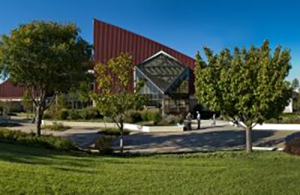Writing Center Verb Tense
(405) 682-1611 Ext. 7379
7777 South May Avenue
Oklahoma City, OK 73159
An educational resource of Division of Arts, English, and Humanities
Verb Tense
Verb Tense refers to the form of a verb indicating when an action takes place or when a condition exists. In English, the verb tenses are as follows:
Simple Tense
Present Tense
uses the simple form of the verb and usually indicates an action that takes place when you speak or write, or an action that occurs regularly. It is used to:
- Describe what is happening now, in the present:
- We work slowly.
- The breeze rocks the boat.
- Describe a habitual or regularly occurring action:
- Horror movies give him nightmares.
- The English class meets at 10:00 on Mondays.
- Describe a fixed-time future event:
- The semester ends on May 13.
- The ship leaves port at midnight.
- Discuss "timeless" events and activities:
- Laurel and Hardy repeatedly get into trouble.
- Jay Gatsby wants it all.
- Discuss plot, characters, or meaning of literary work:
- In “Letters from Birmingham Jail,” King discusses indirect action.
Past Tense
indicates an action that took place in the past and is formed
by adding -d or -ed
to the simple form of regular verbs, or by changing the form of irregular verbs.
- Charles Lindbergh flew across the Atlantic Ocean on May 20, 1929.
- With a knife, Macbeth killed King Duncan.
Future Tense
indicates action that will take place. Although a number of constructions can be used to indicate fuure action, future tense verb forms
consist of the auxiliary (helping) verb will plus the present tense form of the verb
. Future tense has the following uses:
- Indicates a future action that will definitely occur.
- Halley's Comet will reappear in 2061.
- Indicates intention.
- The college has announced it will require all students to undergo a mandatory blood test.
- Indicates what will happen if certain conditions are met.
- If you expose flame to an open gas container, a violent reaction will occur.
- Indicates probability.
- The land boom in Florida will most likely continue.
*** NOTE *** shall is formal usage in future tense used only in the first person (I, We). At all other times, use will.
Perfect Tense
Perfect Tenses
designate actions that were completed or will be completed before other conditions are acted upon. Perfect tenses are formed with the appropriate form of the
auxiliary (helping) verb have plus the past participle (-ed or -en form of the verb)
.
Perfect perfect
tense indicates an action that has begun in the past and extends up to (or through) the present, or an action that has occurred at no specific time in the past.
Present perfect is formed with have or has plus the past participle
.
- She has seen all of Shakespeare's plays.
- My father has invested his money wisely.
- I have corrected my mistakes on the test.
Past perfect
tense indicates an action that was completed at some specific time in the past, or occurred before another action took place (usually mentioned within the same sentence).
Past perfect is formed with had plus the past participle
.
- By the time Alfred Wallace wrote his paper, Darwin had already published The Origin of Species.
- Before he knew what he was doing, Hamlet had killed old man Polonius.
Future perfect
tense indicates that an action will be finished before some specified or predictable time in the future (usually mentioned within the sentence), or before some other future action occurs.
Future perfect is formed with will have (shall have only in very formal writing) plus the past participle
.
- By the time a commercial fusion reactor is developed, the government will have spent billions of dollars in research.
- World population will have reached 8 billion by the year 2000.
Progressive Tense
Progressive tense forms express ongoing, continuing action. Progressive forms consist of the appropriate auxiliary (helping) verbs plus the present participle (-ing form of the verb).
Present progressive
(also called present continuous) tense indicates an action that is happening at the time it is written or spoken about.
Present progressive is formed with am, is or are plus the present participle
.
- The crowd is looking up at a man standing on the ledge of a tenth story window.
- Law is becoming an overcrowded profession.
Past progressive
tense indicates an action continuing in the past, or an action that was occurring at the same time another took place.
Past progressive is formed with was or were plus the present participle.
- The French revolutionary Marat was stabbed to death while he was bathing.
- Nintendo's Game Boy was selling well last Christmas.
Future progressive
tense indicates an action that will be continuing at a future time.
Future progressive is formed with will be plus the present participle.
- Next month, NATO forces will be holding military exercises.
- I will be going to England next year.
Present perfect progressive
tense describes action ongoing from the past and is likely to continue into the future.
Present perfect progressive is formed with has been/have been plus the present participle
.
- The child's fears have been growing steadily.
- Kelley has been living with Stuart for several months now.
Past perfect progressive
tense indicates a past action which continued until a second action occurred. Both actions are usually mentioned within the same sentence.
Past perfect progressive is formed with had been plus the present participle
.
- Before Julius Caesar was assassinated, he had been increasing his political power.
- David and Amy had been dating long before they were ever married.
Future perfect progressive
tense describes an action that will continue until a future time (usually mentioned with the same sentence).
Future perfect progressive is formed with will have been plus the present participle
.
- By eleven o'clock, we will have been driving for seven hours.
VISUAL GUIDE TO VERB TENSES
| VERB TENSE | USE |
| simple PRESENT | simple form of verb |
| simple PAST | simple form of verb +d/ed |
| simple FUTURE | will + simple form of verb |
| PRESENT PERFECT | have/has + the past participle |
| PAST PERFECT | had + the past participle |
| FUTURE PERFECT | will have + the past participle |
| PRESENT PROGRESSIVE | is/are + the present participle |
| PAST PROGRESSIVE | was/were + the present participle |
| FUTURE PROGRESSIVE | will be + the present participle |
| PRESENT PERFECT PROGRESSIVE | has been/have been + the present participle |
| PAST PERFECT PROGRESSIVE | had been + the present participle |
| FUTURE PERFECT PROGRESSIVE | will have been + the present participle |









